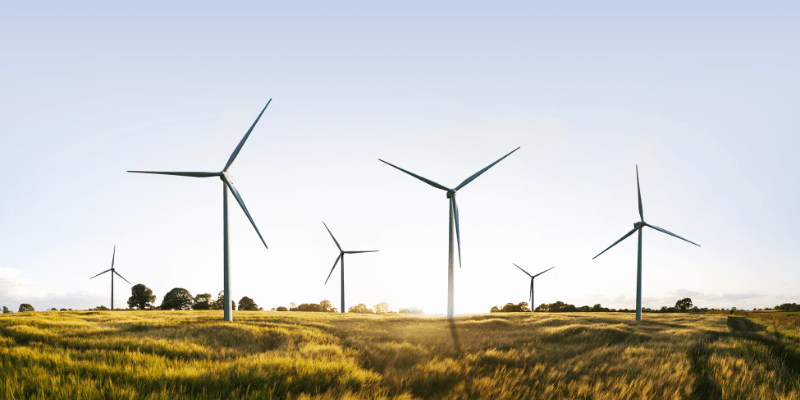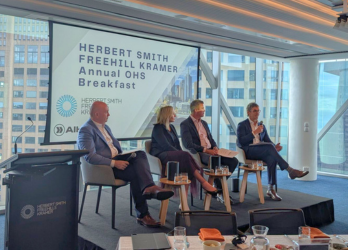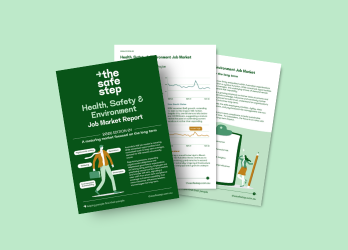Leading a Safe Transition to Renewable
Page Published Date:
September 20, 2022
Australia is on the cusp of a major transition. The move to cleaner, renewable energy will require a significant shift in skills and knowledge amongst workplace health and safety professionals.
Those working in the resources sector (and within other businesses looking for secure, sustainable energy) will need to upskill in scientific, engineering, and technical capabilities to properly appreciate the risks and opportunities created by the shift to renewables. Read on to learn more.

Cleaner energy
In the past decade innovation and investment in cleaner energy has accelerated massively. Climate change sits at the top of the world’s social, political, and economic agendas.
In Australia, renewable energy has almost doubled since 2017 and currently accounts for 32.5% of the nation’s electricity[i]. Greater policy certainty being sought by the Federal government will help provide the springboard for cleaner energy projects to accelerate further.
Health and safety professionals will play a pivotal role in helping the nation scale-up its use of cleaner energy.
An opportunity for HSE professionals
While the risks involved with established technologies such as solar, wind and hydro are well understood, the HSE risks associated with new and emerging technologies are still being discovered. Extensive upfront work needs to go into understanding the known risks of these technologies, including keeping abreast of new standards and codes as they are released.
Origin Energy’s General Manager HSE, Patrick Murphy, believes the transition to renewables will be more complex than many organisations realise. “We need to unpack what the transition to net zero will mean for the health and safety community. We must better understand the challenges and opportunities for our function as we pivot into the future,” Murphy said at a recent Safe Step HSE leader’s forum.
He believes lessons from domestic and international incidents must be incorporated into the design construction and commissioning planning for development projects. New failure modes are still being discovered for these technologies which adds risk to the success of the project.
Case study: Origin Energy
Origin Energy’s investment in renewables includes industrial-scale solar farms, grid-scale batteries, pumped hydro and system security infrastructure. Next on the horizon are innovations in waste to energy, community batteries and a host of new storage technologies including liquid metal and zinc bromide batteries and gravity solutions.New Paragraph
With an increasingly diverse portfolio of assets, the organisation’s health and safety team is having to navigate a whole host of scientific, engineering, and technical challenges.
The demand for new capabilities within the resources sector, coupled with an incredibly tight labour market is creating a significant skills and resources gap. “We are experiencing an unprecedented period of renewable project development in Australia. Shortages of contracting services, key personnel and construction equipment are affecting contracting partners’ willingness to engage on new projects,” said Patrick Murphy, from Origin Energy.
Specialised skills needed now and in the future
HSE professionals who want to differentiate themselves within the energy and resources sectors can educate and upskill around emerging risks. “It’s not just a matter of supervising a contractor. We need to be leaders in this space,” explains Murphy. “We must help lead regulators, lead industry and lead the community.”
There is a significant opportunity for the health and safety community to understand, consult and communicate the risks, rewards and costs of adopting cleaner energy technologies.
Renewables also open the door for people with new skillsets to enter and succeed in the HSE profession. Specialist chemical, engineering and technical skills will be required as new energy solutions emerge. “There are very few safety people with knowledge of batteries,” explains Murphy.
The Safe Step CEO, Aaron Neilson, agrees, noting that there has been a distinct shift towards generalist skill sets and the ability to lead and influence change in more recent times. “People skills will remain critical, however there will likely be a shift towards a more informed, technical, engineering-based skill set for sectors such as energy, particularly as it relates to front end design of new technologies,” Neilson said.
How can we help?
Has your safety team got the capabilities and experience to transition to cleaner energy solutions? Do you need assistance developing a sustainable transition strategy? As Australia’s leading recruitment and search consultancy specialising in Health, Safety, Environment and Wellbeing, we can connect you with HSE specialists on either a permanent or temporary project basis.
Or, if you are a health and safety professional wishing to contribute to the renewables transition please get in touch. We can connect you with a future-forward organisation and others innovating in this field




